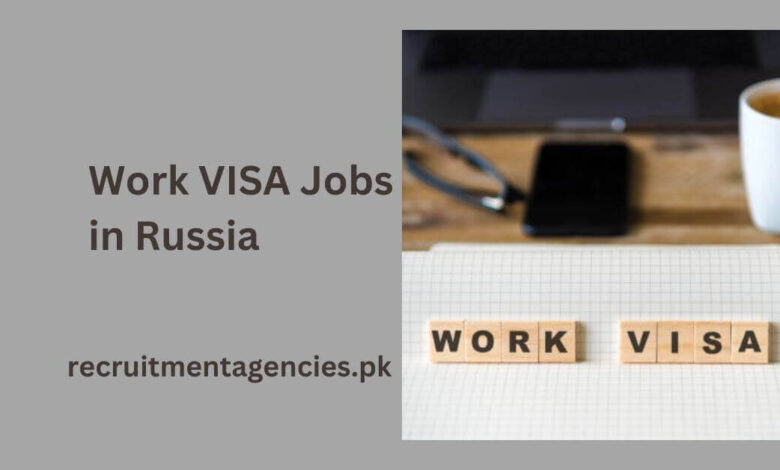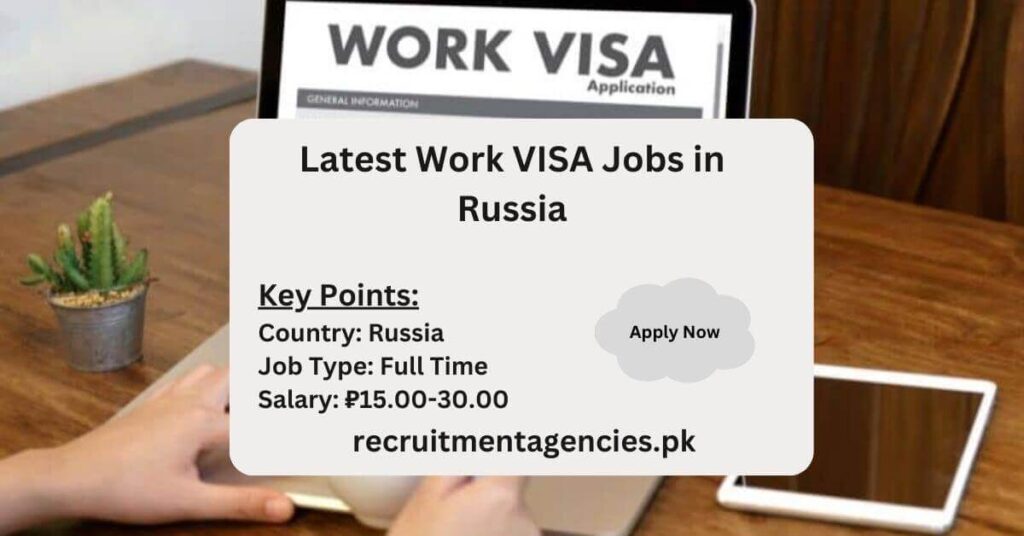Work VISA Jobs in Russia 2025

Foreign laborers are increasingly flocking to Russia in search of employment opportunities in a variety of sectors, including manufacturing, agriculture, IT, construction, healthcare, and hospitality. Many Russian companies are providing visa sponsorship for professional and unskilled workers under the Russian Work Visa Program in 2025.
Check Also: Unskilled Jobs in Georgia For Foreigners – Apply Now

List of Work VISA Jobs in Russia:
A number of critical sectors in Russia are experiencing skill shortages in 2025, highlighting the critical need for skilled labor to support numerous industries (Ref. Tass). Particularly pronounced are these shortages in the following regions:
- Highly skilled Blue-collar workers: Highly skilled Engineers, construction laborers, and transportation professionals are in high demand due to their requisite expertise. This is indicative of a more pervasive global trend in which the scarcity of expert manual labor and technical positions is increasing as a result of technological advancements and demographic changes in the labor force.
- Specialists in Information Technology (IT): The IT industry’s divide has been further exacerbated by the emigration of proficient IT personnel. The current scarcity is of the utmost importance because IT is instrumental in the digital economy, cybersecurity, and innovation. It impacts government operations, small businesses, and large corporations equally.
- Healthcare and Education Professionals: There is a significant demand for physicians, educators, and specialists from a variety of fields. Public health, education, and the general standard of living are all significantly impacted by these occupations, which are indispensable elements of society.
Types of Russian Work VISA:
In 2025, Russia will offer two primary categories of work visas to combat these shortages:
- Highly Qualified Specialist Visa (HQS): This visa is intended for professionals who have received a substantial salary offer and simplifies the immigration process for top-tier talent.
- Regular Work Visa: Intended for non-US citizens who have received job offers that are below the HQS salary threshold; however, it necessitates the administration of more complex quotas and permits.
In addition, the eligibility requirements for both of these forms of work visas for Russia in 2025 are as follows:
| Eligibility Criteria for Russian Work (VISAS) | ||
| Eligibility Criteria | Highly Qualified Specialist Visa (HQS) | Regular Work Visa |
| Salary Requirement | Must exceed 2 million rubles annually. | There is no minimum salary requirement. |
| Work experience and skills | Demonstrable experience, skills, or achievements relevant to the position | Not explicitly required, but relevant qualifications to the job are necessary. |
| Educational Background | Not mandatory, but a relevant degree or qualifications can strengthen the application. | Qualifications should be relevant to the offered position. |
| Clean Criminal Record | Required, typically shown through a police certificate from the applicant’s home country. | Required, with a need for a police certificate demonstrating a clean background. |
| Medical Certificate | Necessary: proving fitness to work | Required to certify the applicant’s fitness for work |
| Passport Validity | Must be valid for at least 6 months beyond the intended period of stay. | The passport must remain valid for at least 6 months beyond the visa’s validity period. |
| Employer Requirements | The employer does not need to secure quotas or work permits in advance. | The employer must obtain a work permit specifying the job position and salary. |
| Visa Validity and Entries | Up to 3 years with multiple entries allowed | Typically valid for up to 1 year, with extension possibilities |
Show more
Benefits:
- Professional Opportunities:
The economy of Russia is characterized by its rapid expansion and diversity, which presents a plethora of professional opportunities across a variety of sectors. Industry sectors that may employ foreign nationals include finance, manufacturing, information technology, oil and gas, and tourism. - Cultural Immersion:
The opportunity to completely immerse oneself in the nation’s cultural wealth, historical significance, and longstanding customs is unparalleled when working in Russia. Immersion in Russian culture can be a transformative experience that broadens one’s perspective. - Language Skills:
By working in Russia, non-Russian speakers may have the chance to improve or acquire their proficiency in the Russian language. Professional opportunities and a more seamless integration into the host society can be enhanced by a strong command of the Russian language. - Competitive Salaries:
Certain sectors in Russia, such as energy, technology, and finance, provide competitive compensation and benefits packages. International workers may have the opportunity to secure compensation arrangements that are exceedingly lucrative, particularly in senior or specialized roles. - Cultural Diversity:
Russia is a vast and diverse nation that is home to a diverse array of ethnicities and cultures. Working in Russia fosters cross-cultural appreciation and comprehension by enabling interactions with individuals from a variety of regions and origins. - Opportunities for Networking: Working in Russia provides the opportunity to establish professional networks and cultivate connections on a regional and global scale. Networking can provide individuals with the opportunity to explore new business ventures, collaborations, and career opportunities.
- Career Development:
Russia is home to a plethora of multinational corporations that offer opportunities for professional development and the improvement of one’s skill set. International employees have the capacity to develop leadership skills, expertise, and experience that are advantageous to their long-term objectives. - Exploration and Travel Opportunities:
The diverse geography and expansive territory of Russia offer a plethora of opportunities for exploration and travel. International employees are afforded the privilege of visiting historical sites, natural wonders, and iconic landmarks throughout the country during their vacation days. - Healthcare and Social Benefits:
International laborers may be eligible for healthcare and social benefits provided by their employers or the Russian government, subject to the terms of their employment. This may encompass pension contributions, medical insurance, and supplementary welfare provisions. - Personal Development:
The chance to reside and operate in a foreign country, such as Russia, can foster substantial personal development, independence, and resilience. Overcoming cultural and linguistic barriers, adapting to new environments, and navigating unfamiliar situations can lead to personal growth.
How to find and apply for Work VISA Jobs in Russia:
Employment in Russia and the application for the proper work visa require the completion of a sequence of procedures. A comprehensive guide to navigating this process in 2025 is as follows:
Step 1: Identify Job Opportunities
- Russian Job Boards: Utilize platforms such as HeadHunter, SuperJob, and Rabota. Mail.Ru.
- Employment opportunities in Russia are advertised on international job boards, including LinkedIn and Indeed.
- Resources Specific to the Industry: Refer to the websites of pertinent professional associations, organizations, and the Ministry of Labor in your field.
Step 2: Apply for Jobs
- Tailor Your Application: Format your resume and cover letter in accordance with the job description. Consider translating them into Russian if necessary.
- Interview Preparation: The process of interview preparation involves the practice of responses to common inquiries and conducting research on the organization.
Step 3: Accept a Job Offer
- Negotiate Employment Terms: The terms of employment, which encompass salary, benefits, and other provisions, should be negotiated.
- Job Offer Letter: Upon accepting the offer, you will receive an official employment offer letter that must be submitted with your application for a Russian visa.
Step 4: Choose the Right Type of Russian Visa
- Assess Eligibility: Determine, based on the job offer and salary, whether you qualify for the Highly Qualified Specialist Visa (HQS) or must apply for a Regular Work Visa.
Step 5: Apply for Your Russian Work Visa
- Gather Documents: Obtain the requisite documentation, including a passport, employment offer letter, medical certificate, and clear criminal record certificate.
- Complete the Visa Application: Complete the visa application form that the Russian consulate or visa center may provide.
- Submission of Application: Submit the application, along with the requisite documentation, to the Russian consulate or an authorized visa center in your country of domicile.
Step 6: Visa Processing and Approval
- Await Processing: The duration of processing may differ. Visa applications for HQS are typically processed rapidly.
- Issuance of Visas: Upon approval, you will be issued a work visa that will permit you to enter Russia.
Step 7: Register Upon Arrival
- Migration Card: Completion of a migration card is required upon arrival in Russia.
- Registration: Register with the local migration office within seven business days of your arrival..
Frequently Asked Questions:
Is Russia open for work visa?
Work visa can be issued to foreign citizens entering the Russian Federation for employment purpose, as well as foreign employees, teachers, accredited reporters, equipment assembly specialists etc. Work visa can be single (with validity of up to 90 days).
How much salary in Russia per month?
The average salary in Russia varies by location and industry, but in 2023 was about 73,709 Russian rubles per month. The minimum wage in Russia was 22,440 rubles per month as of January
Can I get job easily in Russia?
Securing work permits in Russia can be challenging due to strict regulations and extensive paperwork. However, with the right strategy, it becomes a key advantage. Streamlining the process enables businesses to quickly enter the market, establish operations, and build strong teams.



